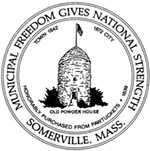
With 75 percent voter approval on Nov. 6, Somerville to establish local ordinance, create local committee with power to recommend projects for funding by added annual revenues of $1.5 Million; Alderman must approve all CPA spending for historic preservation, recreation and open space, and affordable housing
Ten days after Somerville voters overwhelmingly approved local ballot Question 4, Mayor Joseph A. Curtatone today announced the city’s next steps in creating the local mechanisms to implement the Community Preservation Act (CPA). As directed by the enabling state legislation, the Curtatone Administration will propose a local ordinance establishing a nine-member Community Preservation Committee to begin the process of developing recommendations to allocate additional revenues that the City will begin receiving under the terms of the state’s CPA law. The total annual amount raised under the CPA will vary with the city’s total property tax revenues and the amount of money disbursed by the state’s CPA fund to participating communities. Based on current property tax assessments in Somerville and on this year’s rate of disbursement from the state fund, Somerville’s Board of Assessors estimated that, had the CPA been in place this year, the city would have accrued over $1.5 million in additional funding for the three specific purposes covered by the CPA law: historic preservation; open space and recreation; and affordable housing.
“Somerville’s voters have approved our participation in the CPA by a three-to-one margin, and I know the Board of Aldermen is ready to work with me to fast-track this law onto the books,” said Curtatone. “The elections results will be certified on November 21. In the meantime, I plan to sit down with representatives of the Massachusetts Community Preservation Coalition, which is the non-profit that serves as a statewide clearinghouse for information and analysis of local CPA initiatives. Before we develop a local ordinance, we’ll want to get their recommendations on best practices for setting up and administering a CPA program.”
“As for establishing a local Community Preservation Committee, the state says we need between five and nine members,” Curtatone said. “My plan is to create a nine-member committee that includes all of the members mandated by state statute, including one member each from the Conservation Commission, the Historic Preservation Commission, the City’s Planning Board and the Somerville Housing Authority.”
“As for the types of projects that will be funded with CPA revenue, it’s important to remember that the new committee will take the lead in analyzing options and setting priorities,” Curtatone said. “Their recommendations will go to the Board of Aldermen for further review and it would be premature to start discussing specifics now.”
The Community Preservation Act Enabling Statute (Mass. General Laws Ch. 44B) specifies that a participating community must spend “not less than 10 per cent of the annual revenues in the Community Preservation Fund for open space, not less than 10 per cent of the annual revenues for historic resources and not less than 10 per cent of the annual revenues for community housing. In each fiscal year, the legislative body shall make appropriations from the Community Preservation Fund as it deems necessary for the administrative and operating expenses of the community preservation committee and such appropriations shall not exceed 5 per cent of the annual revenues in the Community Preservation Fund.”
The measure approved by Somerville voters calls for a 1.5 percent surcharge on each real property tax bill. Property tax percentage rates are not affected, and the additional surcharge is calculated only after all allowable exemptions have been applied – including a $100,000 exemption provided under the terms of the CPA statute. Calculations by the Somerville Board of Assessors show that, based on current rates the additional amount paid by the average single family homeowner would be approximately $33, with the average condo owner paying approximately $17.00, and average two-family and three-family owners paying an additional $49 and $61, respectively.
“I think the voters understood that the Community Preservation Act would give us the ability to make some major public investments at a modest cost,” said Curtatone. “Our challenge now is to make the most of this new revenue source in a transparent and inclusive way that maximizes value to the community as a whole. Given the number of historic structures and recreational facilities in this community, and the affordable housing goals we’ve laid out within the SomerVision comprehensive plan, we’ll have lots of eligible options.”














Reader Comments